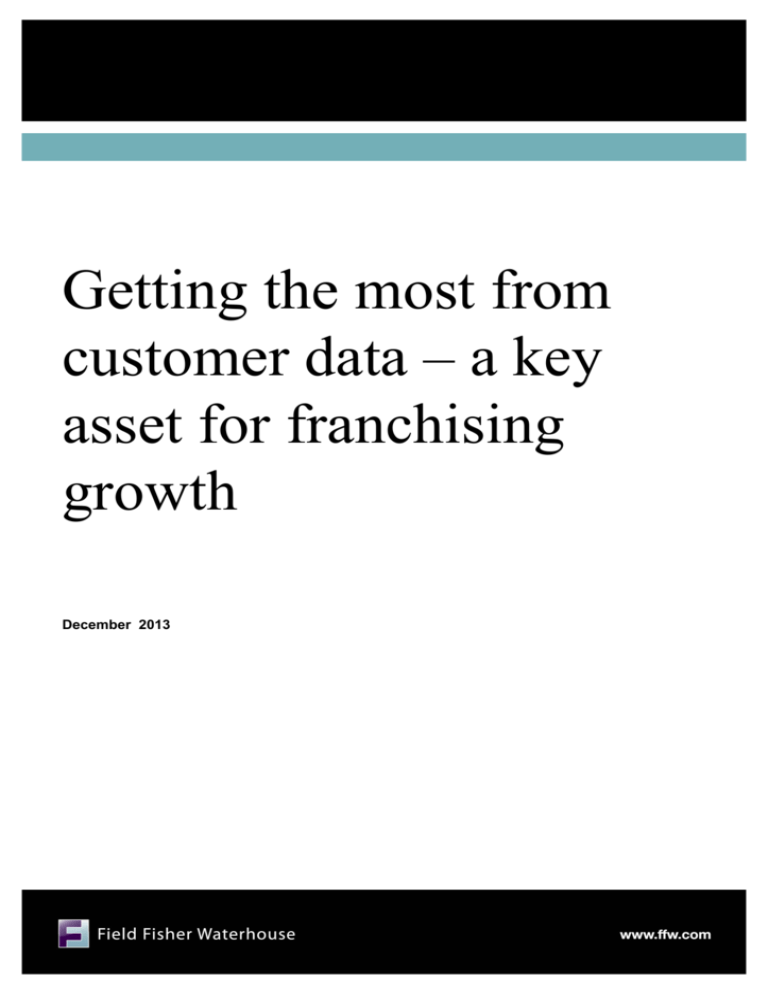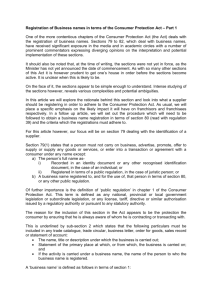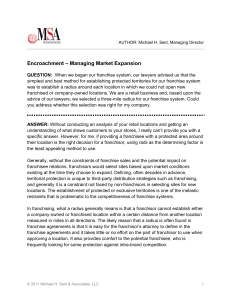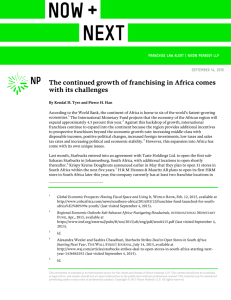
Getting the most from
customer data – a key
asset for franchising
growth
December 2013
1
Getting the most from customer data – a key asset for franchising growth
Introduction
Increasingly in the future, when an international franchising
business is asked to identify its most valuable asset, it may
well point to its customer data. Inexhaustible developments
in technology and the rise of technology for the masses
mean that businesses now have access to information
about how their customers tick as never before. Whereas a
business might previously have run a marketing campaign
based on focus group feedback, now it can target its
marketing based on how individuals visit its website and
use its app (on tablets as well as smartphones), as well as
how they rate and recommend it on social media.
Moreover, a business can perform this analysis of customer
interactions on staggering amounts of data.
Opportunity
The world markets have opened up and franchisors have
looked to internationalise by exploring new territories,
frequently in the Far East. The opening up of certain
'goldmine' territories (eg, China) to franchisors offers the
promise of substantial growth. In many of these territories,
major franchisors' brands are already widely known and an
engaged customer base already exists. In other territories
and for many brands, it will take more time to build up a
loyal customer base, and franchisors may look to social
media and their online presence to generate interest and
gauge reaction.
In the offline world, franchisors will increasingly want to
provide the same in-store experience to a loyal customer,
whether that customer is in a franchisee store in
Manchester or Moscow. Franchisors that deliver a
seamless service in which customers feel special and
customer needs are anticipated based on astute data
marketing and analysis can reap a massive loyalty reward.
Effective use of customer data can exploit the personalised
offline experience in an online setting. It can enable
franchisors to respond more quickly to customer trends and
develop an integrated approach to marketing and brandbuilding campaigns. Franchisors that embrace this
approach should ensure that teams are structured around
the customer and not just the channel, thus guaranteeing
more integrated collaboration between the corporateowned business and franchise-owned business.
2
Data protection rules on a
global stage
Any handling of customer data is likely to trigger the
application of data protection and privacy rules. Issues of
intrusiveness and data security concerns have
increasingly led to more countries legislating for data
protection. For instance, in recent months Singapore and
South Africa both passed data protection laws. However,
the standard that remains the strictest is that set out in
the EU Data Protection Directive (95/46/EC). As those
who have dealt with the Data Protection Directive before
will know, there are restrictions on the transfer of
personal data outside the European Union. This
restriction can be perplexing for international businesses
that are keen to push into new geographies such as the
European Union. Nonetheless, there are ways of
meeting the data transfer compliance requirements,
such as through the comparatively new innovation of
binding corporate rules, which a number of truly global
companies have now adopted (including, for obvious
reasons, a major international hotel group). What makes
the binding corporate rules solution so unique is that it
establishes a framework for global data protection
compliance inside a multinational organisation that is
consistent, even though it crosses borders, and thus
builds trust – it is not concerned solely with the technical
requirement to transfer personal data legitimately. Being
'joined up' and consistent is also becoming more
necessary than ever before, particularly given the risk of
brand damage and new legal liabilities emerging under
new legislation. Customers could take fright and opt out
in droves, depriving franchisors of the ability to mine and
exploit these new communications channels. Getting this
right will soon be seen as absolutely essential for
consumer-facing brands in most sectors, and not just the
obvious ones.
Gaining customers, building
trust
Compliance with data protection rules – which may have
been seen in the past as an obstructive, legalistic
requirement – can actually be central to building trust
and loyalty with individual customers. An individual who
understands how his or her personal data is being used,
and who has an element of choice about how it is used,
is much more likely to share that data with an
organisation. On the other hand, because of greater
consumer awareness and concern about the potential
abuse of customer data, an organisation that is cagey
about its collection and use of personal data or that gives
individuals little choice may well lose customers. In a
technology-driven age where more people are aware of
their privacy rights, a brand that demonstrates that it 'gets'
privacy will have an advantage over its competitors.
Who must comply with data
protection rules?
In the European Union, the law places compliance
obligations on data controllers – those organisations that
make decisions about personal data collection and use. A
data controller may engage service providers (known as
'data processors') to carry out some of the data processing
on its behalf, but the data controller is ultimately
responsible. Data controllers have quasi-ownership rights
over the personal data collected, so it is crucial in any
franchise relationship to establish who the data controller is
and whether there is more than one. For instance, the
franchisor will nearly always be the data controller of
customer data, but a franchisee may be either a data
controller or a data processor, depending on the
arrangement between the parties. The franchisor and
franchisee are usually independent data controllers – that
is, they both have rights to access and use the personal
data, but for their own separate purposes. A franchisee
may be a data controller of customer personal data even if
the franchisor lays claim to IP rights in the data. The
important thing is to ensure that the parties agree on their
roles and that, to the greatest extent possible, this is
documented in the contract.
What does data protection
compliance look like?
EU law will apply to organisations that are established (ie,
operate a business, branch or subsidiary, including a
franchise) in an EU member state and collect customer
data. An organisation caught by EU law will need to put in
place processes that meet the requirements of local law,
including:
registering with the local data protection authority;
providing notices to individuals;
obtaining marketing consents;
granting access to data; and
ensuring appropriate data retention and data
security.
Certain EU jurisdictions have slightly more prescriptive
rules in some areas – for instance, Spanish law sets out
very specific requirements on data security. In particular,
franchisees and franchisors will want to understand the
rules around marketing and how they can best use
technology to connect with their audiences.
Managing franchisees
A franchisor will also need to consider its strategy for
managing franchisees and, in particular, what rights it
has over customer data held by the franchisee. If a
franchisor wants the right to control e-marketing
campaigns for all customers, its franchisees are likely to
be required to share access to customer databases with
it as a matter of course. If this is the case, the parties will
need to think carefully about what customer consents
are required. Alternatively, a franchisee may want a
certain amount of discretion to run local marketing
campaigns suited to the specific territory (eg, a
promotion for Chinese New Year).
While perhaps not an issue to dwell on at the beginning
of a franchising relationship, the franchisor will also need
to consider what happens to customer data where:
one party breaches the franchising agreement so
that it terminates;
the franchising agreement expires; or
the franchisor or franchisee is acquired by a third
party.
A franchisor will usually want to ensure that a former
franchisee cannot compete in the market with the new
franchisee, and should thus include a mechanism in the
franchise agreement to regulate the ongoing rights to
use – and the obligation not to use – customer data.
Competition laws should be taken into account in
ensuring the effectiveness of such restrictions.
Loyalty schemes
The success of various loyalty schemes has highlighted
the fact that people are prepared to give away access to
3
Getting the most from customer data – a key asset
for franchising growth
much of their data if they receive a benefit in return. Loyalty
schemes are not in themselves a new phenomenon, but
new technology has given companies much greater access
to information about customer behaviour and preferences.
Franchisors and franchisees can take advantage of the
new insights obtained through 'mining' the data captured by
loyalty schemes to get to know their customers and provide
them with benefits which keep them loyal. It is significant
that the company behind one of the most successful UK
loyalty schemes – Aimia, which runs the Nectar card
programme – developed a set of data values (known as the
Transparency, Added Value, Control and Trust (TACT)
Rules) that places consumers at the heart of its data
management activities. Good privacy practices can
enhance trust and brand recognition for franchisors – and
the deeper the relationship that the franchisor builds with its
customers, the greater the rewards.
Multi-channel approach
Now more than even before, a franchisor can engage with
customers across a variety of channels. Franchisors will be
keen to ensure that, as they expand, their online presence
remains consistent and on message. However, websites
that target particular geographies (eg, by providing web
pages in the local language or local currency) should
increasingly think about compliance with local data
protection requirements. For instance, the privacy notice on
the website may need to be amended to comply with local
law. Likewise, franchisors should consider what happens to
the customer data collected through that website. Will the
franchisor share it with the local franchisee so that it can
target the customer? If so, does the franchisor need to
obtain customer consent to do so? Of course, a franchisor
can choose to give its franchisees the freedom to modify
the relevant web pages to reflect the local market. There is
emerging evidence that this is a particularly successful
model, although franchisors will still ultimately want a
significant degree of control over how the country
franchisee runs the content and engages with customers.
Privacy and data protection rules are still adjusting to the
rapid growth of apps, but this will continue to become an
extremely popular way for individuals to purchase goods in
the future – take the huge success of the Domino's Pizza
app, for example. Tech-savvy consumers (especially the
youth market) will expect to be able to interact with their
favourite brands from their smartphone or tablet.
Franchisors that can spot the best ways to engage with
customers through technology have the potential to gain
the most.
4
Customer data in the cloud
It is no surprise that a number of drivers have led
companies to use cloud services to store their customer
data. The drive to reduce costs and the need for greater
data security resilience (typically found in highly
sophisticated tech companies offering cloud services) are
just two factors that have encouraged businesses to move
to cloud services. All franchisors (whether operating global
businesses or tech-savvy domestic businesses) that
involve the collection and analysis of customer data are
thus likely to consider storing data in the cloud. Where the
customer data is subject to EU data protection rules,
franchisors should consider how to meet their obligations
and reduce the risk of non-compliance. Many, if not most,
of the big cloud players are based in the United States and
have 'safe harbour' status, allowing EU data to be
transferred to their companies in the United States,
although a number also now have clouds limited to the
European Union only. Franchisors engaging cloud
providers should ensure that the contract provides sufficient
reassurances about data security and access to the data,
particularly if franchisees will be given some level of data
access.
A helping hand to increase
customer trust and interaction
Although there will be some sceptics due to the bad press
that data protection has received in the past, good data
protection compliance – when used together with other
emerging technologies and customer engagement
techniques such as social media and messaging
technologies – can be a significant enabler for businesses
by increasing customer trust and encouraging interaction.
This can help franchisors and franchisees to know more
about their customers and thus open up new and enhanced
marketing strategies. The spread of privacy and data
protection rules globally and the likely adoption of a new
data protection regulation in the European Union will again
emphasise the need for businesses to comply. However,
compliance should be seen not as a drawback, but rather
as a means of exploiting customer data in the most
effective way possible. A failure to take data protection
compliance seriously can result in serious fallout for
companies, whether that entail a loss of reputation,
compensation claims or regulator fines. A number of major
companies have learned this to their cost when their noncompliance with the rules became public. It is likely to be
only a question of time before a franchisor and its brand is
similarly caught out.
For further information on this topic please contact Gordon
Drakes, Chris Wormald, Victoria Hordern or David Naylor at
Field Fisher Waterhouse LLP by telephone (+44 20 7861
4000), fax (+44 20 7488 0084) or email
(gordon.drakes@ffw.com, chris.wormald@ffw.com,
victoria.hordern@ffw.com or david.naylor@ffw.com). The
Field Fisher Waterhouse website can be accessed at
www.ffw.com
Gordon Drakes
Senior Associate
t: +44 (0)207 861 4525
e: gordon.drakes@ffw.com
Chris Wormald
Partner
t: +44 (0)207 861 4299
e: chris.wormald@ffw.com
Victoria Hordern
Director
t: +44 (0)207 861 4260
e: victoria.hordern@ffw.com
David Naylor
Partner
t: +44 (0)207 861 4150
e: david.naylor@ffw.com
This publication is not a substitute for detailed advice on specific transactions and should not be taken as providing legal advice on any of the topics discussed.
© Copyright Field Fisher Waterhouse LLP 2013. All rights reserved.
Field Fisher Waterhouse LLP is a limited liability partnership registered in England and Wales with registered number OC318472, which is regulated by the Solicitors
Regulation Authority. A list of members and their professional qualifications is available for inspection at its registered office, 35 Vine Street London EC3N 2AA. We use
the word “partner” to refer to a member of Field Fisher Waterhouse LLP, or an employee or consultant with equivalent standing and qualifications.
5








